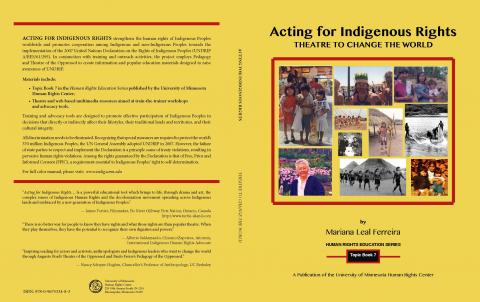
Book Review
Transformative. That’s the word. Acting for indigenous Rights by Mariana Leal Ferreira can provide color, meaning, emotion, and a transformative intellectual view of education. The book is a guide to getting up on your feet and mobilized for action. Let me describe two possible transformations.
Imagine a small news article buried on the fifth page of your metropolitan newspaper. The article is two inches long, with the headline “Indigenous Leader Killed in Amazon.” Something about a land dispute, farmers clearing rainforest. For even a moderate U.S. environmentalist like myself, on a Monday morning in 2003 that article would be only a tiny blip on a sleepy world consciousness. For a conservative Brazilian businessman, the words “Xavante tribe” might bring certain previous associations like: “belligerent, self-serving hooligans.” Whether momentarily sad or overtly hostile, the world judgment ultimately becomes black and white, cold and monetary: “he got in the way of ‘progress.’”
Then confront yourself with Mariana’s play The Color Red in chapter 7. Say out loud the Xavante elder’s name: Joa-quim Ma-ra-de-zu-ro. Witness for a traditional way of life, murdered. Examine the text, the children’s paintings in color, what they felt when he died and other visuals on the U. of Minnesota Human Rights webpage. You realize that Mariana the anthropologist was there at the time; these Xavante children are her adopted family. Stand up and move around, that’s what theater does. Order the book. Get agitated, then focus your energy. This is a clear case of right and wrong, both morally and environmentally. Study the UN Declaration on the Rights of Indigenous Peoples. What kind of non-violent actions are possible? – ah yes, politicized art, that tension too few explore.
Read again carefully the text of The Color Red. Look at the yellow flowers bleeding red. Imagine all this spoken in an endangered indigenous language. Urucu is red body paint. Wapru is blood. Ipre is red the favorite color, meaning both life and death. Now perhaps you feel more fully alive, filled with a different vision and emotion. Perhaps negative world judgment need not fall inevitably against the Xavante; the bulldozers destroying beauty can be stopped. You cannot go to the Amazon rainforest this month, but you know other causes deserving a voice. You read chapter 3 by Mariana and Jiwon Chung -- Give Wings to Your Imagination and Change the World: Write and Perform Your Own Play!
The second transformation is more intellectual and philosophical. This time remember an old white paperback book about education and social action. The author’s name was hard to pronounce and his terminology confusing. Freire, that was the name, Paulo Freire. He was dismissed by some as too leftist when that went out of style in the U.S. during the 1980’s. Maybe you actually read his Pedagogy of Hope? Freire coined new meanings for words and challenged corporate power. Conscientizacao was one of those words – raising and transforming your consciousness towards activism against oppression. Like Joaquim Maradezuro made small and colorless by a tiny news story, too many of us underestimate Freire’s full stature as a giant among educational philosophers.
In secondary education, where I work, manipulating passive students to raise test scores dominates the agenda. A cadre of 21st century industrialists (Microsoft, Boeing, etc. & the Washington Roundtable) met with our Washington state superintendent of education; they were frightened that Singapore has higher math scores. So now we test more, pressure harder so that the children in our education factory graduate better able to conform, to serve the system. Even social studies is given less time during the elementary school day. Some researchers visit third world communities, eager to mine the territory for a good academic article to further their careers. Billionaire donors use the Charles Koch Foundation for funding graduate students to read Ayn Rand, study Adam Smith and justify lowering corporate taxes. Is that all we have to offer? Where is our activist tradition, our John Dewey progressive education? Where is our moral conscience?
Acting for Indigenous Rights: Theatre to Change the World helps answer those questions. Using techniques from legendary Brazilian theatre director Augusto Boal’s “Theatre of the Oppressed” movement, Mariana Leal Ferreira and her students bring Freire to life. They make his philosophical ideas concrete, dramatic and embodied in specific issues that have confronted indigenous peoples. Rather than the politics of the left or the right, universal human rights declarations are the ethical axioms. This book challenges America’s schools . Do we educate students to submit and conform, or to challenge and transform?
Phil J. Davis
Educator, author of Guerrilla Visions: Wild Tales of Teaching Human Rights at an Alternative High School